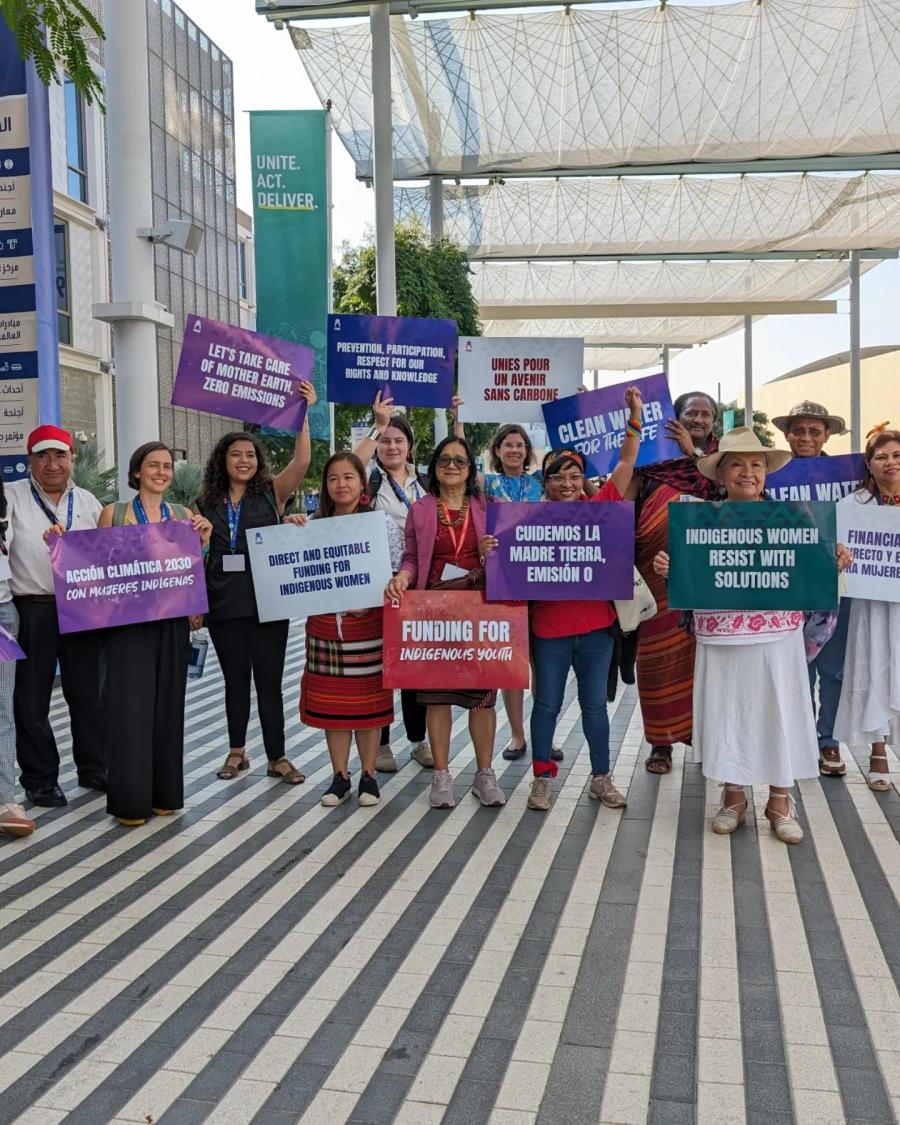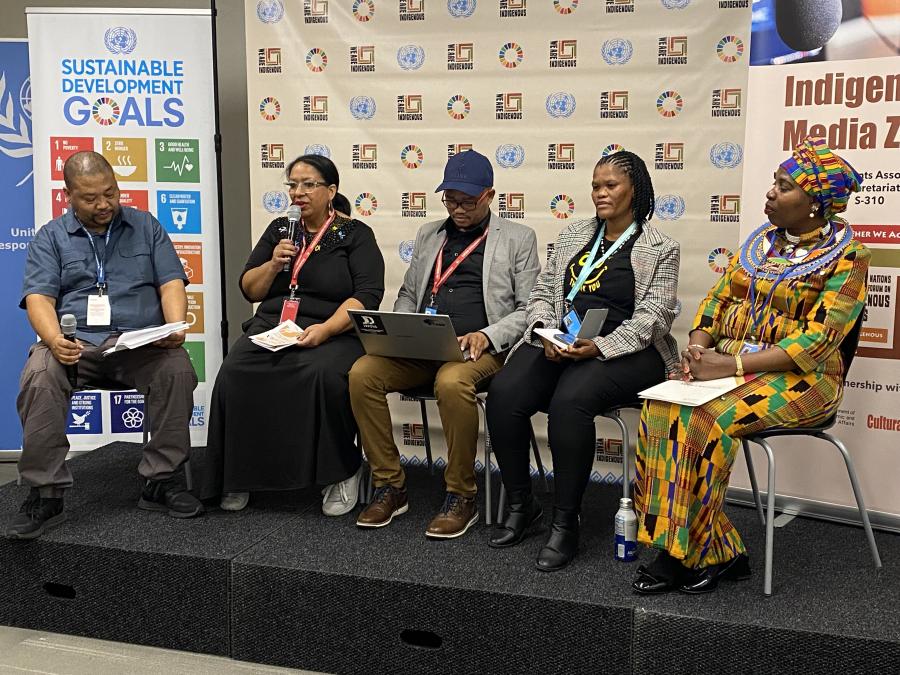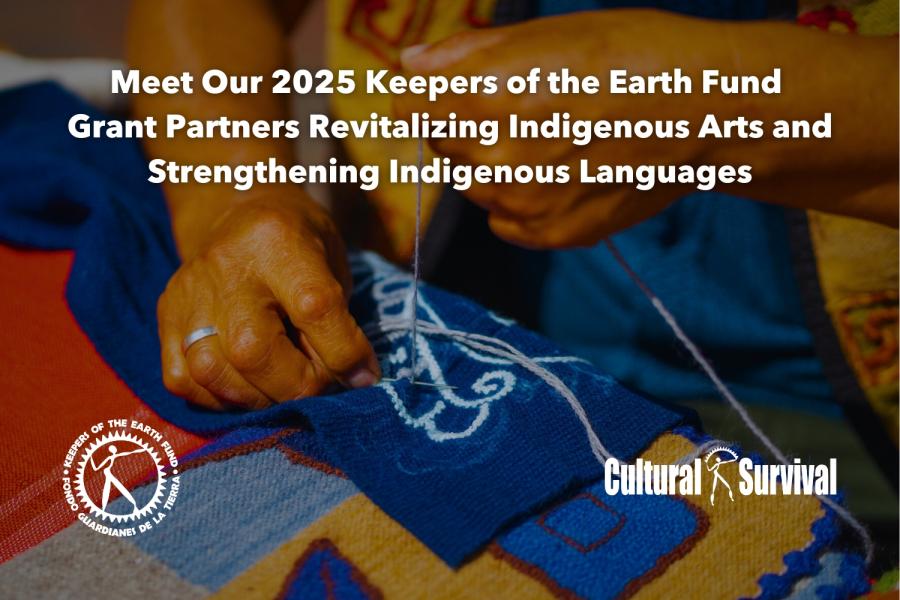
“Free, Prior and Informed Consent (FPIC) is one of the most important principles that Indigenous Peoples believe can protect their right to participation. It is embedded in the right to self-determination. The duty of States to obtain Indigenous Peoples’ FPIC entitles Indigenous people to effectively determine the outcome of decision-making that affects them, not merely a right to be involved.” --UN Expert Mechanism on the Rights of Indigenous Peoples
Free, Prior and Informed Consent (FPIC) is an emerging standard in the dialogue on Indigenous Peoples rights; some argue that it is becoming part of customary international law. At Cultural Survival’s recent board meeting in October, Stella Tamang (Tamang) from Nepal, Grand Chief Edward John (Tl’azt’en) from Canada, Vincent Nmehielle (Ikwerre) from Nigeria, and Nicole Friederichs weighed in on what this concept actually means in practice. They see FPIC as an important standard Indigenous people can use to claim their rights to self-determination, consultation, and participation in decision-making. Governments and corporations can no longer ignore these principles.
FPIC is a standard protected by international human rights law. It states that “all peoples have the right to self-determination” and “all peoples have the right to freely pursue their economic, social, and cultural development.” In the words of the UN Special Rapporteur on the rights of Indigenous Peoples, James Anaya (excerpted from Indian Country Today), “We need to return to the origins of the discussion about [FPIC...having] to do with identifying Indigenous Peoples’ rights of self-determination over lands and resources. With those rights come certain safeguards, and one of those safeguards is that those rights can’t be affected or impacted or diminished without consultation and Free, Prior and Informed Consent.
“Anybody with property understands that you can’t just take the property without consent, unless there’s some over-arching governmental purpose. Because of this special significance of lands and resources to the cultural survival of Indigenous Peoples...it would have to meet a very, very high burden of justification. [In] other parts of the world, companies or governments are saying, ‘Okay, we’re going to get your consent’… [but] very often not in the most equitable terms and very often in ways that diminish the rights of those involved.”
FPIC is protected under the International Labour Organization Convention (ILO) 169 and the UN Declaration on the Rights of Indigenous Peoples, where it is specifically mentioned five times (Articles 10,11,19,28, 29). The duty to consult is further reflected in Articles 19 and 32. ILO 169 Article 6 also requires that consultation with Indigenous Peoples be carried out through institutions that are representative of Indigenous communities, and specifies that Indigenous people should control the process by which representatives are determined.
The Meaning of FPIC
“In plain terms, FPIC is knocking on somebody’s door and asking for permission before you come in,” explains Grand Chief John. A central element of FPIC is genuine inclusion, disclosure, and respect for Indigenous Peoples decision-making processes. “Many times Indigenous Peoples are accused of being anti-development, but the only claim Indigenous people are making is that they really want to be part of the decision-making,” maintains Tamang. After centuries of exclusion, dispossession, and discrimination, Indigenous people want their voices heard.
Under current international law, governments are obligated to consult Indigenous communities before any development affecting their lands and resources takes place, and even more broadly, any decisions directly affecting Indigenous Peoples and their self-determination require their consultation and consent. The final study on Indigenous Peoples and the right to participate in decision-making by the UN Expert Mechanism on the Rights of Indigenous Peoples advises on the proper implementation FPIC: “The element of ‘free’ implies no coercion, intimidation or manipulation; ‘prior’ implies that consent is obtained in advance of the activity associated with the decision being made, and includes the time necessary to allow Indigenous Peoples to undertake their own decision-making processes; ‘informed’ implies that Indigenous Peoples have been provided all information relating to the activity and that that information is objective, accurate and presented in a manner and form understandable to Indigenous Peoples; ‘consent’ implies that Indigenous Peoples have agreed to the activity that is the
subject of the relevant decision, which may also be subject to conditions.”
Nmehielle, who is an Indigenous rights lawyer and international law professor, elaborates. “FPIC is a concept based on autonomy of the individual. Indigenous Peoples’ rights have been so violated in the past by those who felt they knew what’s best for Indigenous Peoples, it becomes a concept to allow them to make the decision on their own as to whether a project or action is beneficial to them. It’s like taking a referendum: do we really want this or not? We want to make sure Indigenous Peoples are not taken for granted, are consulted regularly, and make decisions based on what they know to be true—the positives and negatives about the particular initiative that affects them. That is the bottom line.”
Friederichs, a law school clinician, adds, “When you are talking about FPIC, you are talking about the broader duty to consult and then the overarching principle of participation. The way I read the Declaration is that states have a duty to consult with Indigenous Peoples and the goal of consultations should be to obtain their FPIC. Participation is about remedying centuries of denying Indigenous Peoples access to decision-making that was happening without their voice at all. This is a way to make sure that the states recognize they have an obligation to actually bring Indigenous people to the table and listen to them.”
A Process Right vs. Substantive Right
As Grand Chief John sees it, “FPIC is a right. It’s not simply a concept; it is a right to [a] process. In many cases the natural relation is to lands, territories, and resources. If somebody’s coming in to your territory to put a pipeline or a mine, then they should talk to you and determine what it is that they’re planning. [There are] those who just go to the state government or national government and then come and say, ‘we got a permit from the government to put a pipeline in here.’ What they need is permits from the Indigenous people themselves.”
Many governments pay lip service to the UN Declaration, but as Grand Chief John says, “when the issue of land rights comes to the fore, suddenly people start backing off and saying, ‘hey, wait just a minute, we didn’t mean that you people have any rights to your land. We stole it fair and square, and you don’t have it anymore.’ That’s why I come back to the Declaration, as a remedial instrument to right the wrongs of the past; these rights are recognized in an international instrument to the UN. These rights, and these processes containing their rights, are designed to remedy the historic injustices.”
When Is FPIC Required?
The UN Declaration on the Rights of Indigenous Peoples requires that the Free, Prior and Informed Consent of Indigenous Peoples be obtained in matters of fundamental importance for their rights, survival, dignity, and well-being. As written in Article 19, ”States shall consult and cooperate in good faith with the Indigenous Peoples concerned through their own representative institutions in order to obtain their free, prior and informed consent before adopting and implementing legislative or administrative measures that may affect them.”
Some argue that FPIC is required in every case concerning Indigenous Peoples, their lands, or their resources, such as when new legislation is being considered. Tamang gives an example: “In Nepal we are not limiting FPIC only to development projects. FPIC is not merely informing and getting consent: it is about the effective and meaningful participation of Indigenous Peoples, including Indigenous women. We are now drafting a new constitution and lobbying for the meaningful participation of Indigenous Peoples, and it is the responsibility of the government to ensure their participation in the decision-making process."
Others see the need to obtain consent as especially vital when the following conditions are set to occur: relocation of Indigenous Peoples from their lands; storage and disposal of hazardous waste on Indigenous Peoples’ lands; removal of cultural, intellectual, religious, and spiritual property; and when large-scale development projects would have a major impact on the lands and survival of Indigenous Peoples (for example, the flooding of traditional territories and sacred sites from the construction of a dam).
Limits of FPIC
There are differing ideas about whether FPIC extends beyond the right to be consulted to also include veto power. In Nmehielle’s opinion, “It’s not about veto power, it is about meaningful engagement: if it’s a development project, it has to be sustainable. Indigenous people have to benefit from it and be included in the whole process in accordance with what affects them positively rather than adversely.” For example, “has an environmental assessment been done? What is the 20-year effect going to be? What benefits and values accrue to us as a group?” According to Nmehielle, a few Indigenous communities, such as the Royal Bafokeng Nation in South Africa, have turned development into something they want to do on their own terms and have worked with the developers to benefit
from the projects.
The skeptics of FPIC often point to the UN Declaration as being a “soft law” document, meaning that it is aspirational but not legally binding. However, as Nmehielle states, “For anyone to be able to explore the non-bindingness of the Declaration, they are not ready to do something good. There are parts of it that are considered customary international law. FPIC is a piece of it…whether or not there’s going to be a veto depends on the circumstances of how powerful that particular group is relative to the issues contended.” He continues: “The companies are not usually the problem; it’s the countries, it’s the states. Because at the end of the day, [companies] tend to get their licenses from the states, and then get [empowered] by the state to either ignore Indigenous people or engage with them. If a state says you have to engage with Indigenous people, life becomes easier in a development situation. But Indigenous people can [also] press some of these issues and possibly go to court to obtain the maximum consultation necessary, to ensure that their consent is not taken from them.“
The objective of consultations is to obtain Free, Prior and Informed Consent. Every day we hear about cases where corporations say they consulted Indigenous Peoples by holding a single meeting (sometimes not in their own language) and informing them of what is being planned. But a PowerPoint presentation with a Q&A is not the same as obtaining FPIC. In many cases it is clear that while documents were signed supposedly giving consent, the vast majority of the Indigenous community were uninformed about the consent process or did not want to give up the resources in question. In short, this process is often egregiously manipulated.
As the Expert Mechanism on the Rights of Indigenous Peoples defines it, “consent is a significant element of the decision-making process obtained through genuine consultation and participation. Hence, the duty to obtain the Free, Prior and Informed Consent of Indigenous Peoples is not only a procedural process but a substantive mechanism to ensure the respect of Indigenous Peoples’ rights.”
So what does a meaningful consultation process look like? A true consultation with a goal of obtaining FPIC takes time. It has to respect the local governance and decision-making processes and structures, and it has to occur in Indigenous languages, on Indigenous people’s time frames, free of coercion and threat. Mapping Indigenous territory from Indigenous Peoples’ perspectives is another essential element. Indigenous people are the ultimate judges on whether the consultation process has been meaningful.
Several communities around the world are working on establishing their own protocols on how to obtain their Free, Prior and Informed Consent. The idea of asserting a protocol, a guideline a community establishes as to how outsiders should communicate with them about the proposed outside use of community resources, is an effort to ensure that there is a fair dialogue in agreements and negotiations. It is important to realize that in the process of asserting FPIC, one has to be aware of the political, economic, social, environmental, and even spiritual factors. There is no one formula that can be copied and pasted into each community; it is imperative for developers to understand the context of the communities, and based on that understanding, to develop and adapt the protocols as needed for the best use of the community in their specific environments. The process of creating a community protocol can make communities aware of international human rights standards and help develop their negotiation skills in asserting their rights.
FPIC in Practice
Russia
"In 2005, Novatek, the second largest natural gas company in the Russian Federation, working in the autonomous district of Yamal-Nenetz, designed a socio-economic program for and with the Nenetz peoples affected by its activities, drawing on meetings with community members and leaders. In November 2008, an agreement was signed with the local Nenetz organization defining the terms of cooperation between the company and Indigenous Peoples. The company provided support for infrastructure and allowed Indigenous people to maintain their traditional livelihoods and economy while benefiting from job opportunities in oil and gas developments." Source: Expert Mechanism on the Rights of Indigenous Peoples’ final study on Indigenous
Peoples and the right to participate in decision-making.
FPIC in Practice
Bolivia
"In Bolivia in 2010, the Ministry of Hydrocarbons and Energy coordinated a consultation process on a proposed hydrocarbon exploration project in the Indigenous territory of Charagua Norte and Isoso, located in the Santa Cruz region. Ultimately, the process resulted in a signed agreement between the government and the Guaraní Peoples Assembly of Charagua Norte and Isoso documenting community consent prior to the initiation of exploration activities by the company Pluspetrol of Argentina. The consultation process reached a positive outcome largely thanks to the willingness of the Ministry of Hydrocarbons and Energy to respect the use of traditional Guaraní institutions and systems. Importantly, the process originated from the proposals of the Indigenous communities themselves and guaranteed free, prior, and informed consent for affected communities." Source: Expert Mechanism on the Rights of Indigenous Peoples’ final study on Indigenous Peoples and the right to participate in decision-making.
Cultural Survival’s FPIC Initiative
The most important element of Indigenous Peoples’ ability to claim the right of Free, Prior and Informed Consent is to have informed and organized communities. Cultural Survival has launched a new initiative with the goal of strengthening Indigenous Peoples’ capacity to implement FPIC by increasing awareness and understanding of this right through community media and community exchanges. We are producing and distributing a series of radio programs on topics related to FPIC to inform Indigenous listeners about their rights. Initially, programs will be produced in English, Spanish, and several Indigenous languages for distribution to Indigenous Peoples around the world. Along with the radio series, we are planning community-to-community exchanges (see here read about one of the participating communities) as another valuable and appropriate means of sharing information. These exchanges will include the development of appropriate context-based community FPIC guidelines, which will further strengthen awareness and understanding of those rights. To learn more, visit: cs.org/fpic.



